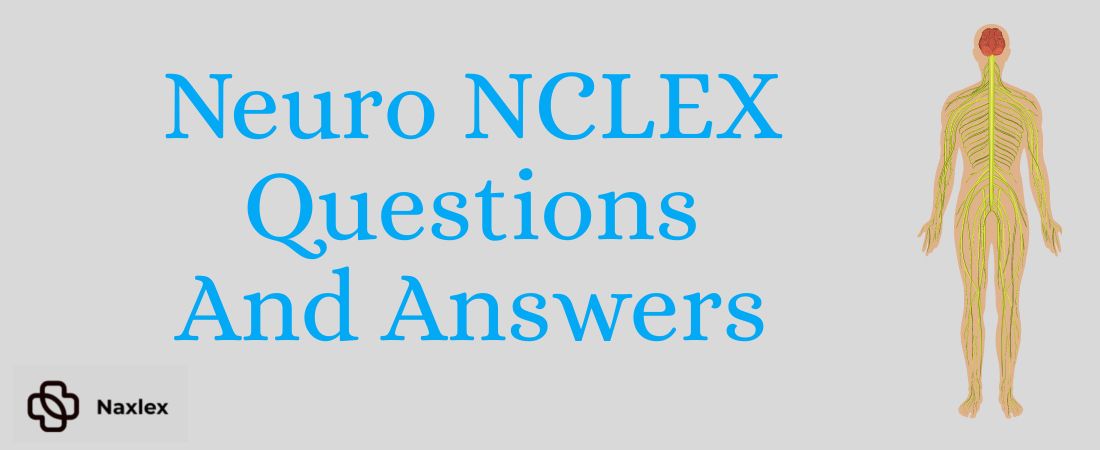Neuro NCLEX Questions - Free Questions and Answers
Neurology is a field of study that relates to the nervous system and its disorders. The nervous system comprises vital body functioning systems such as the brain, spinal cord, and nerves. Multiple sclerosis, Parkinson's disorder, Alzheimer's disorder, and others are some of the neuro topics evaluated in the neuro NCLEX questions.
The neuro system plays a significant role in controlling how the human body works. Clients with neuro-related problems need to be supported by clinically competent nurses. The neuro NCLEX questions can be powerful resources to prepare you for the NCLEX exam. If you need to score a guaranteed A in the exam, prepare using Naxlex neuro items .

Strategies to ace neuro NCLEX questions
As we explore the fascinating landscape of neuro nursing, we will discuss in depth the neuro NCLEX questions with the goal of challenging your skills and broadening your critical thinking skills. The requirements for NCLEX neurological questions can be overwhelming, but don't despair; we are here to prepare you.
Our carefully crafted neuro NCLEX questions have been designed to assess your proficiency in neuro disorders and prepare you for excellence in the upcoming NCLEX test. Let's navigate on a neurological journey to equip you with the skills needed to take the exam with great confidence.
Comprehending the complexities of the neuro NCLEX questions can be overwhelming.
However, with appropriate techniques, you can enhance your capacity to answer the questions as required, thereby boosting your likelihood of passing the exam. Through our set of practice questions, Naxlex provides practical help and guidance to prepare for neuro NCLEX questions. Besides, we offer personalized support to ensure each candidate feels supported.
To help you prepare for the NCLEX test appropriately, below are some tips and strategies you can apply to respond to NCLEX neurological evaluation questions effectively.
1. Reviewing neuroanatomy questions
Evaluating the anatomical knowledge of the human body is paramount among aspiring nurses. To answer the neuro NCLEX questions correctly, you must familiarize yourself with the fundamentals of the anatomy of the entire nervous system: brain, spinal cord, and peripheral nerves. Mastering the format and its functions can give you the foundation for answering neuro questions.
2. Know popular neuro disorders.
Different diseases and disorders affect the nervous system. Preparing for the neuro NCLEX questions requires you to be familiar with different neurological diseases like stroke, seizures, multiple sclerosis, Alzheimer's disorder, and trauma (brain injury). You need to master the pathophysiology of these disorders, their clinical manifestations, and treatment methods.
3. Learn about neurological evaluations.
Studying the crucial components of neurological assessment is paramount to answering neuro NCLEX questions properly. Key factors to master include evaluating mental status, cranial nerves, motor function, and reflexes, among other neuro functions. Understanding these evaluations will help you interpret the signs tested in neuro-related questions.
4. Analyze the main part of the question.
The assessments of neuro NCLEX questions intend to evaluate certain skills in you. It is crucial to pay attention to the stem of the question. The stem is mainly the main thing tested in the question. You must understand what's being tested to give the correct answer. A good thing to do while analyzing the stem is to look for relevant keywords denoting the patient's condition.
5. Factor safety and prioritization
Neurological-related disorders often need immediate interventions. Treatment of neuro disorders requires prioritization to enhance patient safety. As a nurse, you need to recognize critical situations that need prioritization and care. For instance, some neuro processes, such as breathing and circulation, may need neurological emergencies.
6. Eliminate answers
Elimination is an old-school strategy that can help you arrive at the correct answer in multiple-choice questions. It's still an effective method that can help you handle neuro NCLEX questions effectively. If you need to know the correct response, eliminating the incorrect ones is a good strategy to begin with. Elimination increases the chances of selecting the correct answer. However, you must be knowledgeable in neurological concepts to use the elimination method appropriately.
7. Utilize practice questions
Practice is a powerful test preparation method. Practicing neuro NCLEX questions can enhance your neurological skills. You can practice the exam using different preparation materials. A great resource that can help you practice neuro questions is the Naxlex practice test . Our resources are designed to get you the grade you need for the neuro-related questions.
8. Examine rationales carefully
Neuro NCLEX practice questions give a summarized rationale for correct and incorrect answers. Once you complete answering the questions, use the rationales to review the answers. Ensure you answer all the questions to have the rationale for correct and incorrect answers generated. Review all the responses, including the questions you answered correctly. Doing so will help you broaden your knowledge regarding neuro-related questions.
Examples of neuro disorders evaluated in NCLEX
Neurological diseases and disorders are health conditions that range in severity from mild to severe. These types of disorders affect the brain and the nervous system. Neurological disorders can be congenital or acquired and can affect almost any part of the brain and the rest of the nervous system. The following are some common neuro disorders evaluated in neuro NCLEX questions.
Multiple sclerosis (MS): This is a neurological disorder that affects the central nervous system. MS disorder is not contagious. The symptoms of this disease include weak muscles, visual problems, numbness, and other closely related problems.
Parkinson's disorder: This is a progressive nervous system disease affecting body movement and balance. The disease is caused by the loss of neurological cells in certain parts of the brain.
Alzheimer's disease This is a neurological disorder characterized by loss of memory, confusion, lack of concentration, and difficulty thinking properly. The cause of this disorder relates to abnormal buildup of proteins.
Huntington's disease: This is an inherited genetic disease that affects body muscles and coordination. The disorder is caused by degeneration or breakdown of nervous cells in the brain.
Guillain-Barre syndrome (GBS) is a neurological disorder relating to body paralysis. The disease occurs after two weeks following exposure to bacteria or viruses in the body.
Neurological disorders are critical health issues that can negatively affect the functioning of the human body if not well addressed. Fortunately, nursing interventions can address the various neurological disorders through appropriate treatment methods once symptoms of the disorders have been identified.
If you want to prepare for neuro NCLEX questions in readiness for the nursing challenge ahead, Naxlex guides can help you. Subscribe to Naxlex for a guaranteed A in your exam.
Start your journey with us today
Join 1000+ Nursing Students
Powerful learning and clinical tools combined into one platform. The Naxlex Knowledge and Qbanks give you instant and on-the-go nursing knowledge and guidance.




